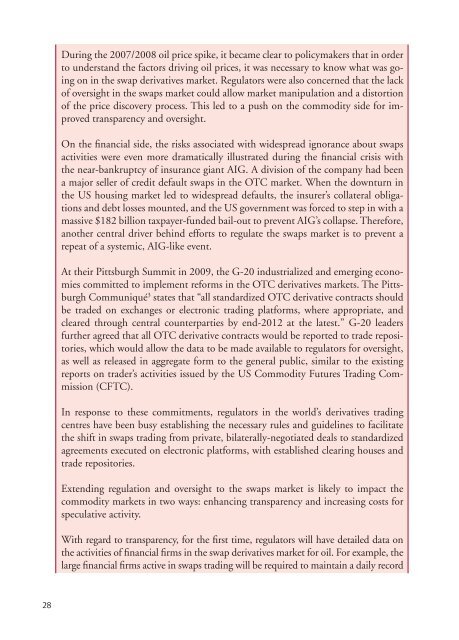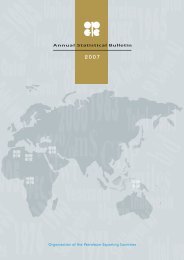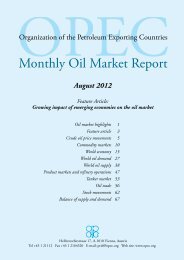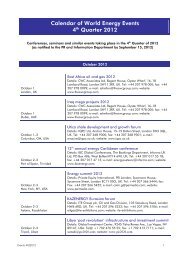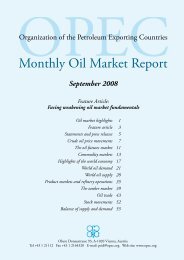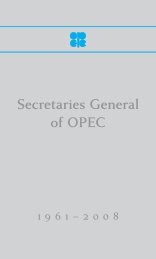World Oil Outlook - Opec
World Oil Outlook - Opec
World Oil Outlook - Opec
- TAGS
- world
- outlook
- opec
- www.opec.org
You also want an ePaper? Increase the reach of your titles
YUMPU automatically turns print PDFs into web optimized ePapers that Google loves.
28<br />
During the 2007/2008 oil price spike, it became clear to policymakers that in order<br />
to understand the factors driving oil prices, it was necessary to know what was going<br />
on in the swap derivatives market. Regulators were also concerned that the lack<br />
of oversight in the swaps market could allow market manipulation and a distortion<br />
of the price discovery process. This led to a push on the commodity side for improved<br />
transparency and oversight.<br />
On the financial side, the risks associated with widespread ignorance about swaps<br />
activities were even more dramatically illustrated during the financial crisis with<br />
the near-bankruptcy of insurance giant AIG. A division of the company had been<br />
a major seller of credit default swaps in the OTC market. When the downturn in<br />
the US housing market led to widespread defaults, the insurer’s collateral obligations<br />
and debt losses mounted, and the US government was forced to step in with a<br />
massive $182 billion taxpayer-funded bail-out to prevent AIG’s collapse. Therefore,<br />
another central driver behind efforts to regulate the swaps market is to prevent a<br />
repeat of a systemic, AIG-like event.<br />
At their Pittsburgh Summit in 2009, the G-20 industrialized and emerging economies<br />
committed to implement reforms in the OTC derivatives markets. The Pittsburgh<br />
Communiqué 3 states that “all standardized OTC derivative contracts should<br />
be traded on exchanges or electronic trading platforms, where appropriate, and<br />
cleared through central counterparties by end-2012 at the latest.” G-20 leaders<br />
further agreed that all OTC derivative contracts would be reported to trade repositories,<br />
which would allow the data to be made available to regulators for oversight,<br />
as well as released in aggregate form to the general public, similar to the existing<br />
reports on trader’s activities issued by the US Commodity Futures Trading Commission<br />
(CFTC).<br />
In response to these commitments, regulators in the world’s derivatives trading<br />
centres have been busy establishing the necessary rules and guidelines to facilitate<br />
the shift in swaps trading from private, bilaterally-negotiated deals to standardized<br />
agreements executed on electronic platforms, with established clearing houses and<br />
trade repositories.<br />
Extending regulation and oversight to the swaps market is likely to impact the<br />
commodity markets in two ways: enhancing transparency and increasing costs for<br />
speculative activity.<br />
With regard to transparency, for the first time, regulators will have detailed data on<br />
the activities of financial firms in the swap derivatives market for oil. For example, the<br />
large financial firms active in swaps trading will be required to maintain a daily record


